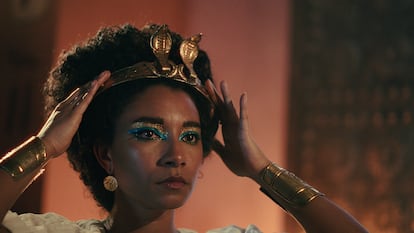Was Cleopatra Black? Why a Netflix series is causing furor in Egypt
The decision to cast Adele James as the Egyptian queen has caused heated debate on social media, an online petition and even a legal complaint

Few historical figures in Egypt are able to stir as much controversy as Cleopatra. The latest debate on the iconic ancient queen of Egypt has been sparked by a new Netflix docudrama called Queen Cleopatra, which stars Black actress Adele James in the lead role. James was cast as a nod to Cleopatra’s alleged African roots. But many Egyptians have criticized the decision, describing it as an attempt to rewrite history. In addition to the furor on social media, much of which is outright racist, the Netflix series has also triggered an online petition, calls for the platform to be banned and even a legal complaint.
Queen Cleopatra — which will premiere on May 10 — is part of the Netflix series African Queens, which is produced by Jada Pinkett Smith and focuses on the history of the female monarchs from the African continent. The first season follows the life of Queen Njinga, who ruled two territories in what is now Angola in the 17th century, and was a reputed politician, diplomat and military leader.
Queen Cleopatra follows the life of the Ptolemaic queen, who ruled between 51 and 30 BCE. The four-part series mixes dramatized scenes with interviews with experts. The trailer has been enough to spark controversy in Egypt. In the clip, one historian says, “I remember my grandmother saying to me, ‘I don’t care what they tell you in school: Cleopatra was Black.’”
In a February interview, ahead of the release of African Queens, Pinkett Smith told Netflix’s promotional website, Tudum: “We don’t often get to see or hear stories about Black queens,” who she described as “the backbones of African nations.” She added that the decision to cast Adele James as Queen Cleopatra was “a nod to the centuries-long conversation about the ruler’s race” as the queen’s ancestry has been disputed, and “Egypt’s population was multicultural and multiracial.”

But many in Egypt have accused the miniseries of historical revisionism and Afrocentrism, a historiographical trend that emphasizes the importance of Black African civilizations — including Ancient Egypt —that may have been destroyed, displaced or minimized by white invaders, including Arabs. Critics, however, say that in the case of Egypt this is pure speculation, arguing that there is no evidence of a mass displacement.
This historical reading is strongly opposed in Egypt, as it dilutes or directly negates the country’s connection with ancient Egyptians. As well as raising identity issues, this view has been criticized as the West has also tried to separate modern Egyptians from ancient Egyptians in a bid to weaken Egypt’s calls for stolen antiquities to be returned.
Petition
In the case of Cleopatra, there has been long-standing discussion about the queen’s ethnicity. Her father was Ptolemy XII, who was of Greek-Macedonian origin, while her mother’s origins are unknown. Some say she was Black, meaning Cleopatra would have been of mixed ancestry, as is Adele James. But there is no evidence to support this.

When the Netflix trailer was released, it was quickly met with backlash on social media, with leading Egyptian actors and archaeologists criticizing the portrayal of Cleopatra as a Black woman. A petition on Change.org called for Queen Cleopatra to be canceled, arguing “Afrocentrism is a pseudoscience that is pushing a group’s agenda to claim Egypt’s history and rob the actual Egyptians of it.” It was signed by more than 85,000 people — and was even shared by the Russian Embassy in Egypt — before it was taken off the platform. Since then, similar petitions have appeared, receiving thousands of signatures.
On Sunday, Egyptian lawyer Mahmoud al-Semary filed a complaint with the public prosecutor demanding that they take “the necessary legal measures” and block access to Netflix’s services in Egypt. According to local media, the Netflix show is guilty of breaching media regulations and trying to “eliminate Egyptian heritage.” And an Egyptian lawmaker has also jumped into the debate, calling on the prime minister and the communications minister to take measures to ban Netflix.
In response to the controversy, which has led to many racist slurs on social media, actress Adele James hit back at the critics. “This kind of behavior won’t be tolerated on my account. You will be blocked without hesitation!!! If you don’t like the casting don’t watch the show. Or do & engage in (expert) opinion different to yours,” she posted on Twitter, sharing screenshots of the racist comments.
This is not the first time the portrayal of Cleopatra has caused controversy. Two and a half years ago, there was also heated debate when it was revealed that Israeli actress Gal Godot would star as Cleopatra in an upcoming movie. She was not considered the best person for the role either.
Sign up for our weekly newsletter to get more English-language news coverage from EL PAÍS USA Edition
Tu suscripción se está usando en otro dispositivo
¿Quieres añadir otro usuario a tu suscripción?
Si continúas leyendo en este dispositivo, no se podrá leer en el otro.
FlechaTu suscripción se está usando en otro dispositivo y solo puedes acceder a EL PAÍS desde un dispositivo a la vez.
Si quieres compartir tu cuenta, cambia tu suscripción a la modalidad Premium, así podrás añadir otro usuario. Cada uno accederá con su propia cuenta de email, lo que os permitirá personalizar vuestra experiencia en EL PAÍS.
¿Tienes una suscripción de empresa? Accede aquí para contratar más cuentas.
En el caso de no saber quién está usando tu cuenta, te recomendamos cambiar tu contraseña aquí.
Si decides continuar compartiendo tu cuenta, este mensaje se mostrará en tu dispositivo y en el de la otra persona que está usando tu cuenta de forma indefinida, afectando a tu experiencia de lectura. Puedes consultar aquí los términos y condiciones de la suscripción digital.









































